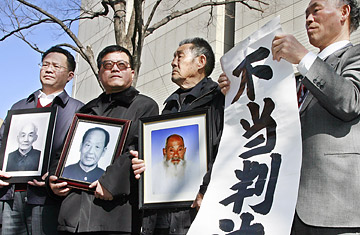
A Japanese supporter (R) displays a banner reading "unfair ruling" while Chinese plaintiffs hold portraits of their fathers outside the Tokyo High Court after a Japanese court rejected a lawsuit by five Chinese people seeking damages from Tokyo for injuries caused by chemical weapons left behind by Japanese troops after World War II.
The news out of Japan is likely to compound the nation's failures in dealing with its wartime abuses against China: The Japanese company responsible for removing chemical weapons abandoned by Japanese forces in China at the end of World War II will not be able to complete its work, with a corruption scandal forcing its closure. That leaves Tokyo with no immediate replacement to complete the complicated cleanup, which Japan is obliged to finish by 2012 under an international treaty.
But critics say the fault lies with the government itself, for a failure of oversight that allowed the Abandoned Chemical Weapons Disposal Corp. (ACWDC) to misappropriate approximately 100 million yen ($1 million) of public funds. And they question the government's commitment to removing the weapons, which remain lethal more than 60 years after the war. Cleaning up these caustic reminders of Japanese aggression in China would be a practical way for Japanese Prime Minister Yasuo Fukuda to act on his stated desire to improve relations between the two countries. Yet, while a Japanese Ministry of Foreign Affairs spokesperson said that the cleanup "is extremely important for improving trust," the government has not indicated how it plans to get the project back on track — nor has it launched a tendering process for companies to bid for the contract.
The ruling Liberal Democratic Party draws important support from organizations that downplay or deny Japanese use of chemical and biological weapons in China during the war. And there are deniers in the opposition Democratic Party of Japan, too: Jin Matsubara, a Democratic parliamentarian known for denying the killing of Chinese civilians by the Japanese Imperial Army in Nanjing in 1937-1938, recently used his speaking time at a Diet session dedicated to discussing the weapons to question their very existence.
The Chinese government says that Japan left some 2 million chemical munitions — shells, bombs and barrels of deadly agents such as mustard gas, phosgene, hydrogen cyanide and lewisite. The Japanese Cabinet Office, which handles issues related to the weapons, declined to estimate the number, but Japanese officials have previously said there were at least 700,000. According to the Japanese government's Abandoned Chemical Weapons Office, most of the weapons are in northeastern China, but some have been found as far south as Guangdong Province. Buried in fields and submerged in streams by the defeated Japanese Imperial Army in 1945, they have since caused an estimated 2,000 deaths, according to Beijing.
Zhou Tong and Liu Hao were among those unlucky enough to learn first-hand about the lingering danger. The two boys, aged 12 and eight at the time, were playing in a river in northeastern China's Jilin Province in 2004, when they came into contact with toxins that had leaked from the abandoned arms. The boys lived, but the illness induced by their exposure forced them to drop out of school. The Japanese government refused to pay damages to the boys' families, despite acknowledging that abandoned chemical weapons had been the cause of their sickness. Such cases inflame longstanding animosities, and potentially threaten to further damage the already fraught relationship between Beijing and Tokyo.
Despite the cleanup stalling over the corruption scandal, Japanese officials claim Tokyo can still fulfill its obligations under the Chemical Weapons Convention to remove and destroy all such munitions left in China by 2012. Minoru Shibuya, the Japanese ambassador to the Netherlands, where the convention is enforced by the Organization for the Prohibition for Chemical Weapons in the Hague, said that "the government of Japan continues to attach top priority" to the project. According to an Organization spokesperson, Japan has reported "no foreseen delays" to meeting its cleanup deadline. But Japan's record does not leave critics confident: The current 2012 deadline is an extension granted after Japan missed its initial deadline of 2007. Key disposal facilities have yet to be built, and Cabinet Office officials declined to say how they would find a replacement firm to take over where ACWDC left off.
Amy Smithson, a senior fellow at the Center for Nonproliferation Studies in Washington, D.C., said that the technical difficulties and expenses for the cleanup are substantial, but that Japan has the technological base to get on with the project — if the political will is in place. "Not surprisingly," Smithson said, "the Chinese and some outside observers have criticized the snail's pace of destruction efforts." That pace has just gotten even slower, highlighting the difficulty the two countries continue to face in putting a nasty past behind them.
